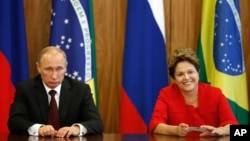A summit of the BRICS group of emerging market countries will abstain from criticizing Russia's recent actions in Ukraine, Brazilian officials said, a diplomatic victory for President Vladimir Putin.
The summit statement will make only a passing reference to Ukraine and will echo the neutral stance adopted by Russia's fellow BRICS countries - China, India, Brazil and South Africa - at the United Nations, according to Brazilian diplomats organizing Tuesday's meeting in Fortaleza.
Facing efforts to isolate Russia by leading Western nations, the BRICS summit provides Putin with a welcome geopolitical platform to show he has friends elsewhere, economic powers seen as shaping the future of the world.
“Russia wins by having Putin at an international meeting where Ukraine is not an issue. It implies that the BRICS reject Western efforts to turn it into a pariah,” said Oliver Stuenkel, an expert on the group at Brazil's Getulio Vargas Foundation.
The BRICS refusal to criticize Russia for annexing Crimea and stirring up rebellion in eastern Ukraine shows that the United States and Europe can no longer co-opt emerging powers into adopting their positions, Stuenkel said.
The BRICS is a diverse group known for its anti-Western rhetoric and a multipolar view of the world that Putin is advocating. Yet none of its members support Russia on Ukraine, and they all abstained when the U.N. General Assembly passed a resolution criticizing the annexation of Crimea in March.
“Abstention is always a big win for Russia when it comes to criticism of relations with its neighbors, and this is what we are going to see at the Fortaleza summit,” said Marcos Troyjo, director of the BRICLab center at Columbia University in New York.
The geopolitical platform provided by the BRICS has become more important for Putin since some doors began to shut on Moscow, such as membership of the G-8 club of leading industrial nations.
“Having been spurned by the G-7, Putin can turn to the BRICS and say, 'Well, I have another peer group and they are the rising powers of the future,”' said Edward Verona, a former president of the U.S.-Russia Business Council and senior advisor at strategic advisory firm McLarty Associates in Washington.
Putin is on a Latin American tour aimed at raising Russian self-esteem and thumbing his nose at the United States, starting with a visit to communist Cuba, Washington's longtime ideological foe in the region.
Seeking to extend Russian influence in Latin America, Putin signed a nuclear energy cooperation deal with Argentina to bolster trade ties.
On Sunday, he attended the World Cup final in Rio. Russia will host the next soccer tournament in 2018.
In Fortaleza, the BRICS leaders will launch a development bank aimed at providing developing countries with an alternative source of finance from the World Bank and International Monetary Fund dominated since World War II by the United States and other Western nations.
The bank, which will have initial capital of $50 billion, is expected to be headquartered in Shanghai. Russia is vying for the first five-year presidency.





